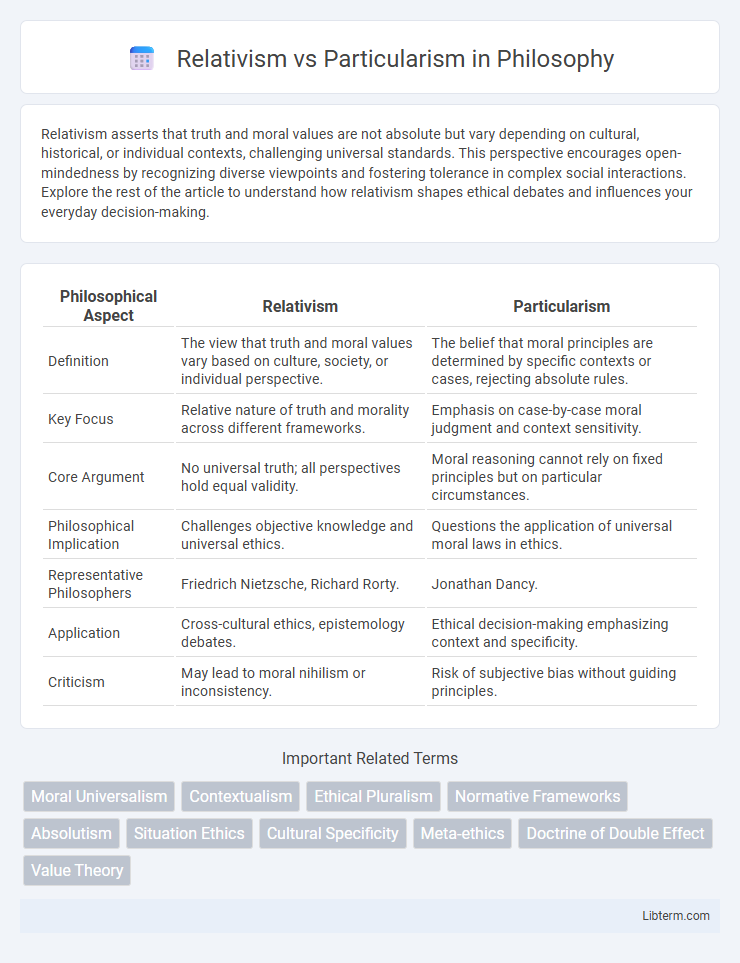Relativism asserts that truth and moral values are not absolute but vary depending on cultural, historical, or individual contexts, challenging universal standards. This perspective encourages open-mindedness by recognizing diverse viewpoints and fostering tolerance in complex social interactions. Explore the rest of the article to understand how relativism shapes ethical debates and influences your everyday decision-making.
Table of Comparison
| Philosophical Aspect | Relativism | Particularism |
|---|---|---|
| Definition | The view that truth and moral values vary based on culture, society, or individual perspective. | The belief that moral principles are determined by specific contexts or cases, rejecting absolute rules. |
| Key Focus | Relative nature of truth and morality across different frameworks. | Emphasis on case-by-case moral judgment and context sensitivity. |
| Core Argument | No universal truth; all perspectives hold equal validity. | Moral reasoning cannot rely on fixed principles but on particular circumstances. |
| Philosophical Implication | Challenges objective knowledge and universal ethics. | Questions the application of universal moral laws in ethics. |
| Representative Philosophers | Friedrich Nietzsche, Richard Rorty. | Jonathan Dancy. |
| Application | Cross-cultural ethics, epistemology debates. | Ethical decision-making emphasizing context and specificity. |
| Criticism | May lead to moral nihilism or inconsistency. | Risk of subjective bias without guiding principles. |
Introduction to Relativism and Particularism
Relativism emphasizes that moral principles and ethical judgments depend on cultural, social, or individual contexts, rejecting universal standards of right and wrong. Particularism argues that ethical decisions should be made based on the specific details and circumstances of each case rather than applying fixed rules. Both frameworks challenge absolute ethical theories by highlighting the significance of context and situational variability in moral reasoning.
Defining Relativism: Core Principles
Relativism asserts that moral truths and ethical standards are not absolute but vary depending on cultural, social, or individual perspectives, emphasizing context-driven evaluation of right and wrong. This principle rejects universal norms, highlighting that beliefs and practices are valid only within specific frameworks or communities. Relativism prioritizes tolerance and understanding of diversity, arguing that no single moral code holds supremacy across all situations.
Understanding Particularism: Key Concepts
Particularism emphasizes the importance of context and specific circumstances in ethical decision-making, rejecting the notion of universal moral principles. It argues that what is right or wrong depends on the particular details of a situation, thus prioritizing flexibility and situational judgment. This approach contrasts with relativism by focusing on case-based ethics rather than culture-based or subjective moral norms.
Historical Development of Both Philosophies
Relativism gained prominence in the 20th century through anthropologists like Franz Boas, emphasizing cultural context for moral and epistemological standards. Particularism developed alongside critiques of universalist ethics, with philosophers such as Jonathan Dancy arguing that moral judgment depends on the unique details of each situation rather than fixed principles. Both philosophies emerged as responses to absolutist frameworks, highlighting the diverse ways human cultures and individuals interpret ethical norms and knowledge.
Major Proponents and Influential Thinkers
Relativism is primarily advocated by scholars like Richard Rorty and Clifford Geertz, who emphasize the variability of truth and morality across different cultures and contexts. Particularism finds major proponents in Jonathan Dancy and Bernard Williams, who argue that moral judgment depends on the specific details of each situation rather than on universal principles. These influential thinkers shape debates by highlighting the tension between flexible, context-dependent ethics and fixed, principle-based moral frameworks.
Relativism vs Particularism in Ethics
Relativism in ethics asserts that moral principles are context-dependent and vary across cultures or situations, rejecting universal moral standards. Particularism challenges rigid ethical rules by emphasizing the importance of individual cases and the nuances that influence moral judgments. Both frameworks highlight the fluidity of ethical decision-making, contrasting with absolutist approaches that prioritize consistent, universal norms.
Strengths and Limitations of Relativism
Relativism's strength lies in its recognition of cultural diversity and the avoidance of ethnocentric judgments, allowing flexible ethical frameworks tailored to specific contexts. Its limitation is the potential for moral ambiguity or inconsistency, as relativism may hinder the establishment of universal ethical standards or impede criticism of harmful practices within a culture. The balance between respecting cultural differences and upholding fundamental human rights remains a critical challenge for relativist approaches.
Strengths and Limitations of Particularism
Particularism emphasizes context-specific judgments, allowing for nuanced decisions tailored to individual cases, which enhances moral flexibility and responsiveness to complexity. Its strength lies in rejecting rigid, universal rules, promoting ethical sensitivity that accounts for unique circumstances and cultural differences. However, particularism faces limitations in providing consistent moral guidance and can lead to subjective or arbitrary outcomes without clear criteria for decision-making.
Debates and Criticisms in Contemporary Discourse
Debates between relativism and particularism center on the universality versus context-dependence of moral principles, with relativists arguing that ethical standards vary across cultures while particularists emphasize the uniqueness of individual cases over fixed rules. Critics of relativism often point to its potential to justify harmful practices under cultural differences, whereas particularism faces challenges in providing stable guidance without overarching principles. Contemporary discourse increasingly explores hybrid approaches, seeking balance between respecting cultural specificity and maintaining coherent ethical evaluation.
Implications and Applications in Modern Society
Relativism, emphasizing cultural and moral diversity, influences modern society by promoting tolerance and open-mindedness, allowing ethical standards to adapt to different social contexts. Particularism challenges universal norms by advocating for case-by-case evaluations, affecting legal systems, workplace ethics, and international diplomacy through nuanced decision-making processes. Both approaches shape debates on human rights, multicultural policies, and conflict resolution, highlighting the balance between global principles and local priorities.
Relativism Infographic

 libterm.com
libterm.com